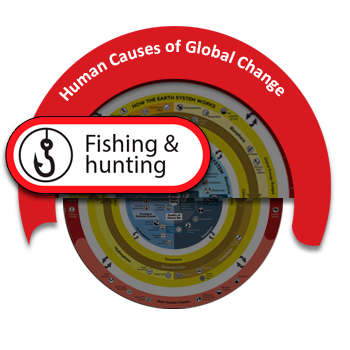Fishing and hunting are the removal of animals from ecosystems by humans for food and/ or sport. Some species are hunted because they are thought to be a threat to human life or livestock or have medicinal uses. Over the last 100 years, human population growth combined with innovations that help humans to locate and catch large numbers of organisms have resulted in dramatic decreases in many species populations worldwide, including many fish, whales, and large land mammals.

A fishing boat in Alaska catching pollock. Credit: Wikimedia
Fishing and hunting impact the Earth system in a variety of ways, including:
- Reducing species populations of the exploited species. If enough individuals are removed from an ecosystem, species can go extinct. Fishing and hunting can also indirectly increase numbers of other species in an ecosystem if by removing a species there is less competition for resources and space among the remaining species in the ecosystem.
- Decreasing species ranges, and therefore altering species interactions.
- Altering the life cycles and traits of organisms. Fishing and hunting often removes large, reproductively mature individuals from species populations, which, in turn, can favor the survival of smaller individuals that can reproduce. Thus, fishing and hunting can drive evolutionary change.
- The amount of food available for human populations. Overfishing and hunting have depleted species populations that were once reliable sources of food.
Can you think of additional cause and effect relationships between fishing and hunting and other parts of the Earth system?
Visit the agricultural activities, species populations, and species ranges pages to learn more about how processes and phenomena in the biosphere affect and global climate and ecosystems.
Investigate
Learn more in these real-world examples, and challenge yourself to construct a model that explains the Earth system relationships.
